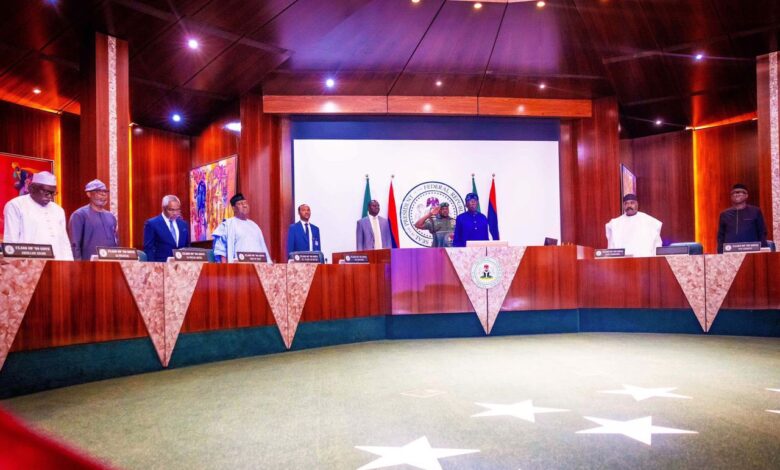FEC Approves Policy Reforms to Strengthen Nigeria’s Intellectual Property, Digital Trade and Services Export Sectors

The Federal Executive Council (FEC), at its meeting of November 6th, 2025, approved four landmark policy initiatives presented by the Honourable Minister of Industry, Trade and Investment, Dr. Jumoke Oduwole. Collectively, these approvals mark a turning point in Nigeria’s innovation, trade, industry and investment landscape, positioning the country to lead Africa’s transition to a digital and knowledge-driven economy, and marking a major step forward in strengthening Nigeria’s industrial base and global competitiveness.
Under the administration of President Bola Ahmed Tinubu, GCFR, the Ministry continues to drive policies that transform productivity, attract investment, and unlock new economic frontiers. The three initiatives – Nigeria’s first National Intellectual Property Policy and Strategy (NIPPS), the ratification of the AfCFTA Protocol on Digital Trade,and establishment of a national coordination mechanism for services exports, to be led by the National Talent Export Programme (NATEP) under FMITI. Together represent a comprehensive framework for modernising Nigeria’s economic infrastructure, and create the architecture for a smarter, safer, and more competitive Nigerian economy.
National Intellectual Property Policy and Strategy (NIPPS)
For the first time, Nigeria now has a unified national framework to protect, commercialise, and enforce intellectual property rights (IPRs) through the National Intellectual Property Policy and Strategy (NIPPS). The NIPPS establishes a coherent ecosystem that connects innovators, creators, researchers, and financial institutions, turning intellectual assets into tradable and bankable capital. This IP Policy positions Nigeria as a regional intellectual property hub for West and Central Africa.
The NIPPS process began in 2020, co-led by the Federal Ministry of Industry, Trade and Investment, the Federal Ministry of Justice, and the Federal Ministry of Arts, Culture, Tourism, and the Creative Economy, with collaboration from key IP agencies including the Nigerian Copyright Commission (NCC), NOTAP, the Patents and Designs Registry, and the Trademarks Registry. The initiative received technical support from the World Intellectual Property Organization (WIPO) and incorporated inputs from over 200 stakeholders across the public and private sectors, academia, and development partners ensuring the policy reflects both global best practices and Nigeria’s national priorities.
Ratification of the AfCFTA Protocol on Digital Trade
Nigeria’s ratification of the AfCFTA Protocol on Digital Trade solidifies its leadership in shaping Africa’s digital economy. Adopted by the African Union in February 2025, the Protocol establishes the first continent-wide legal framework for e-commerce, data governance, cybersecurity, and digital consumer protection.
The Protocol covers key areas including cross-border data flows and protection, cybersecurity standards, electronic transactions and authentication, digital payment systems, consumer rights and redress, and digital intellectual property protection. As Co-Champion of the Protocol, President Bola Ahmed Tinubu, GCFR, has led continental efforts to harmonise digital-trade standards and create a predictable regulatory environment that attracts investment and promotes innovation. Ratification enables Nigeria to influence the rules governing cross-border data flows, taxation, and digital services trade, areas critical to fintech, logistics, creative tech, and e-commerce sectors. It also provides the framework for scaling MSME participation in regional digital value chains and expanding market access to a combined GDP of USD 3.4 trillion across 55 African countries.
With this step, Nigeria moves from participation to policy-shaping leadership, ensuring that Africa’s digital transformation reflects Nigerian innovation, resilience, and ambition.
National Coordination Mechanism for Services Exports (NATEP-Led)
Recognising that services now account for over 50% of Nigeria’s GDP but less than 10% of exports, the Federal Executive Council approved the establishment of a national coordination mechanism for services exports, to be led by the National Talent Export Programme (NATEP) under FMITI. This framework unifies the multiple Federal Government programmes, such as NATEP, into a coordinated structure that promotes Nigeria’s global competitiveness in professional, digital, and creative services.
By 2030, the initiative is projected to:
- Create 1 million decent jobs in the services-export sector
- Contribute USD 10 billion annually to Nigeria’s GDP
- Train 10 million Nigerians for the global services market; and
- Attract over USD 15 billion in investments across the digital and creative industries. This structure positions Nigeria as a global outsourcing destination and Africa’s hub for service exports, anchored on talent, technology, and trust.
Together, these landmark approvals lay the foundation for Nigeria’s economic transformation, where ideas, data, and talent become export commodities that create jobs, deepen industrialisation, and strengthen non-oil revenue.
Source: Proshare.co




